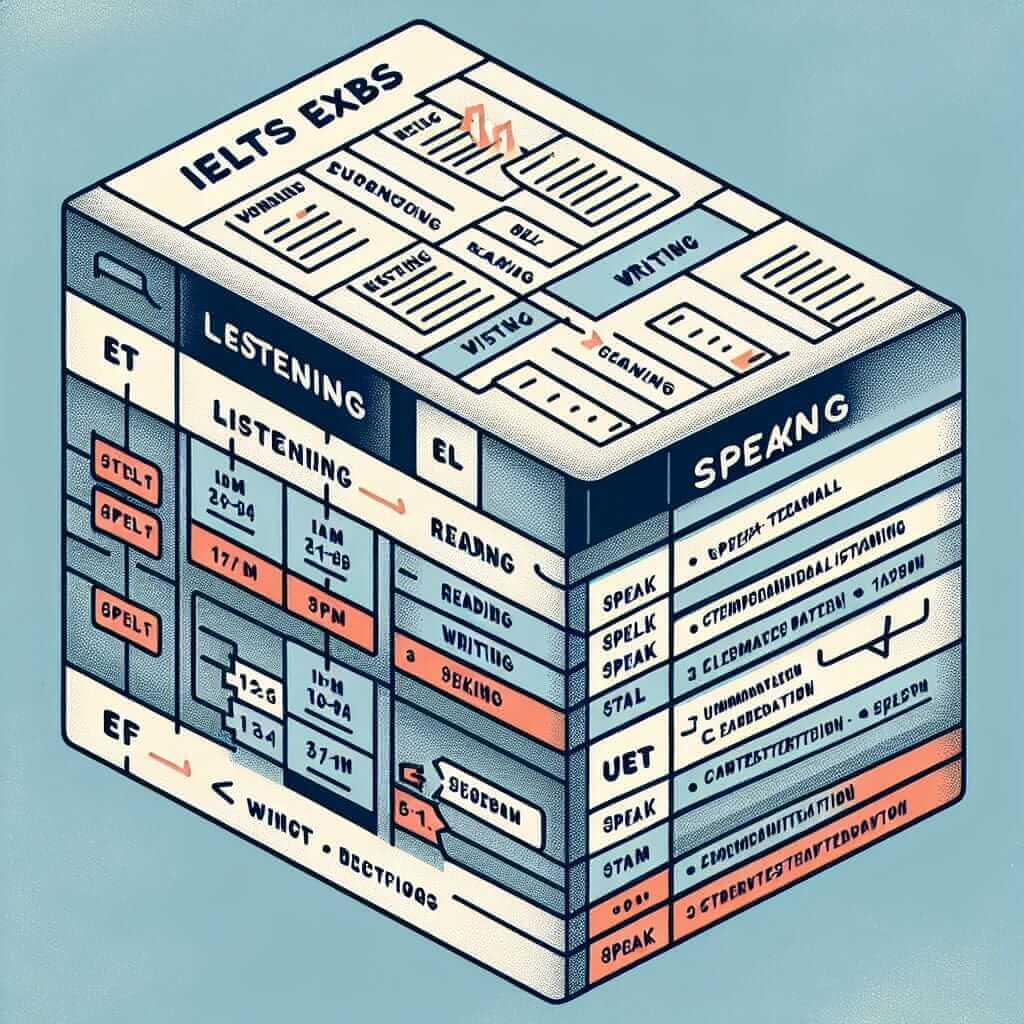Understanding the IELTS test format, including the duration of each section, is crucial for effective preparation and optimal performance. This comprehensive guide will delve into the time allocated for each section of the IELTS exam, providing insights and tips to help you ace the test.
IELTS Test Format: A Breakdown
The IELTS exam assesses your English language proficiency in four modules: Listening, Reading, Writing, and Speaking. The first three modules – Listening, Reading, and Writing – are completed on the same day with no breaks in between. The Speaking test may be held on the same day or up to seven days before or after the other modules.
Here’s a breakdown of the IELTS test format and the duration of each section:
| Section | Duration | Description |
|---|---|---|
| Listening | 30 minutes + 10 minutes transfer time | You will listen to four recordings of native English speakers and answer 40 questions. |
| Reading | 60 minutes | You will read three long texts and answer 40 questions. |
| Writing | 60 minutes | You will complete two writing tasks: Task 1 (summarizing information from a graph, chart, or diagram) and Task 2 (writing an essay). |
| Speaking | 11-14 minutes | You will have a face-to-face interview with a certified IELTS Examiner, including an introduction, a short talk on a given topic, and a discussion. |
Total test time (excluding the Speaking test): 2 hours 30 minutes
Understanding the Time Limits
Listening Section
- 30 minutes: You have 30 minutes to listen to the recordings and answer the questions. The recordings are played only once.
- 10 minutes (transfer time): After listening to all the recordings, you are given 10 minutes to transfer your answers to the answer sheet.
Example: In Section 3 of the Listening test, you might hear a conversation between two students discussing a research project.
Reading Section
- 60 minutes: You are given 60 minutes to read three passages and answer 40 questions. The passages cover a range of topics and are often academic in nature.
Example: You might encounter a passage about the history of printing or the impact of social media on communication.
Writing Section
- 60 minutes: You must complete two writing tasks within 60 minutes. Task 1 requires you to write at least 150 words, while Task 2 requires at least 250 words.
Example: For Task 1, you might need to describe the information presented in a bar graph showing the percentage of people using public transportation in different cities. For Task 2, you might be asked to discuss the advantages and disadvantages of globalization.
Speaking Section
- 11-14 minutes: This section consists of a brief introduction, a one-minute talk on a familiar topic (Part 2), and a more extended discussion related to the topic (Part 3).
Example: In Part 2, you might be asked to describe a memorable trip you took.

Common Mistakes and How to Avoid Them
- Poor time management: One of the most common mistakes test-takers make is not managing their time effectively. Practice pacing yourself during your preparation to ensure you can complete all sections within the allotted time.
- Spending too much time on one question: If you encounter a challenging question, don’t dwell on it for too long. Move on and return to it later if you have time.
- Not reading instructions carefully: Always read the instructions carefully before attempting any section. Misunderstanding instructions can lead to avoidable errors.
Tips for Maximizing Your Time
- Practice regularly: Familiarize yourself with the test format and time constraints by taking practice tests under timed conditions.
- Develop a strategy: Create a plan for each section, allocating a specific amount of time to each question type.
- Learn to skim and scan: Develop efficient reading strategies, such as skimming and scanning, to quickly find relevant information.
- Use the transfer time wisely: During the Listening section, use the 10-minute transfer time to carefully review your answers and transfer them accurately to the answer sheet.
Conclusion
Being aware of the duration of each IELTS section is vital for effective test preparation. By understanding the time limits and employing effective time management strategies, you can approach the exam with confidence and maximize your chances of achieving your desired score. Remember to practice regularly, familiarize yourself with the test format, and develop a strategic approach to tackle each section effectively.